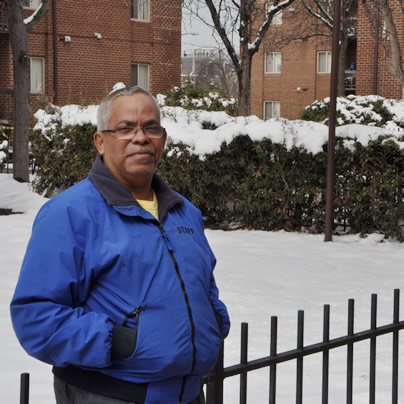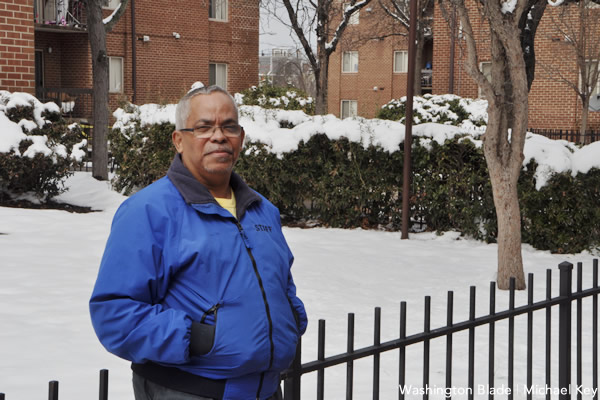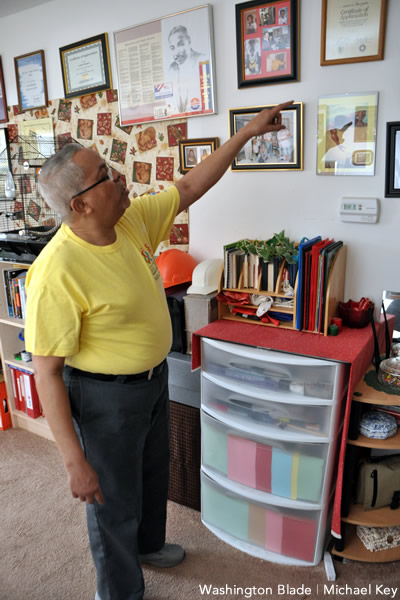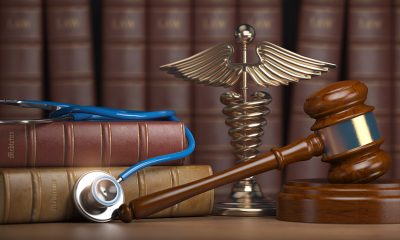National
SPECIAL REPORT: ‘You can’t let adversity get you down’
Many LGBT elders struggling with economic insecurity


Cedric Burgess says he lives ‘check to check’ while relying on government assistance to pay bills. Despite his struggles, he works to give back to the LGBT community. (Washington Blade photo by Michael Key)
Editor’s note: This is the first of a two-part look at how poverty affects elder members of the LGBT community and part of a yearlong Blade focus on poverty. To share your ideas or personal story, visit us on Facebook or email [email protected]. Click here to read previous installments.
“I did my dirt,” said Cedric Burgess, a black gay man and longtime Washington, D.C. resident who grew up in the District. “I was young and full of fun!”
Today, Burgess, 61, is a recovering alcoholic who suffers from depression. He’s been HIV positive for more than 30 years. “I live from check to check,” said Burgess, who receives Social Security disability benefits.
Before undergoing a hip replacement four years ago, he struggled to walk up to his second-story apartment.
“It is a wonder to be able to walk without my cane,” Burgess said. “No matter what pain pills I took, I couldn’t get to sleep. You don’t realize how much pain you’re in. You adapt. I couldn’t cross my legs. Steps weren’t an option.”
At 19, Burgess came out to his family.
“I was accepted by my family. I was taken in,” he said, “that was a blessing!”
For some years, he worked in a series of clerical jobs. In 1982, Burgess, then living and working as an administrative assistant in Atlanta, was hit by a drunk driver. The accident left him with back pain, nerve damage and sciatica. For two years, unable to work, he did physical therapy. In 1984, Burgess returned to work. After returning to D.C., he went back to doing clerical work.
During the AIDS epidemic, his family confronted Burgess.
“They said ‘you gotta get tested,’” he said. “In 1991, after I found out I was positive, I took a two-week vacation. I got HIV through a blood transfusion I received when I had my accident. They weren’t screening transfusions for HIV then.”
In 2006, his back pain became so severe that Burgess left the workforce. He said he retired from the Green Door, a D.C. organization that helps people with mental challenges, where he worked as a program assistant.
“You can’t let adversity get you down, you have to have a positive attitude,” Burgess added. Fortunately, he said, social safety net programs help him to make ends meet. In addition to his monthly disability check, Burgess receives food stamps. His health care is covered by Medicare and Medicaid.
“I receive energy assistance from Pepco and two-thirds of my rent, with funding from the Ryan White Act, is subsidized by the Washington, D.C. Housing Coalition,” Burgess said.
These programs are a lifeline for him. “Without the rental assistance and the Medicare and Medicaid, I wouldn’t be able to afford housing and health care,” Burgess said. “I couldn’t pay for my HIV medications and I couldn’t have had my hip replacement.”

Cedric Burgess says many elders don’t know their legal rights when it comes to housing and other issues. (Washington Blade photo by Michael Key)
Despite living with economic hardship, Burgess leads an active and full life. Committed to helping others, he has volunteered for groups serving everyone from homeless youth to elders. “I’m a goodwill ambassador for the DC Center for the LGBT Community and for AARP,” Burgess said. “I help seniors learn about their rights in housing and in nursing homes. Many seniors don’t know their rights.”
“I believe in God’s healing,” he went on, “I go to church. I have no prejudice against any other religion. I’m a spiritually free person.”
Burgess’s situation is far from unique. Many LGBT older adults (aging Baby Boomers over 50) live with economic insecurity.
“Media and marketing stereotypes view the LGBT community as an affluent niche group filled with couples with double incomes,” said Matthew J. Corso, chief communications officer and board member of the DC Center for the LGBT Community. “The poverty rate among LGBT older adults is much higher than people would think from the marketing view. Older adults can often feel isolated.”
The DC Center’s Coffee and Conversation is a safe space where older adults can connect with others in the community and discuss issues related to living with economic insecurity, Corso said.
People rarely look at economic insecurity and aging, said Robert Espinoza, senior director of public policy and communications for Services and Advocacy for GLBT Elders (SAGE), “People studying poverty don’t look often enough at poverty among LGBT and older people. On the other side, people studying LGBT issues aren’t looking often enough at aging and poverty.”
But studies that have been done show that poverty is high among elders and even higher among LGBT older adults, Espinoza said. Among the findings:
• One in six Americans aged 65 and older lives in poverty, according to a 2013 Congressional Research Service report.
• The poverty rate is as high or higher among lesbian, gay and bisexual people than for heterosexual people, and lesbian couples, 65 and older, are twice as likely to be poor as straight married couples, according to a 2009 Williams Institute Report.
• There are an estimated 1.5 million gay, lesbian and bisexual elders in the United States today. The number is expected to increase to nearly 3 million by 2030, according to “Improving the Lives of LGBT Older Adults” from SAGE, the Movement Advancement Program (MAP) and Center for American Progress.
• Because historically LGBT people have not been able to marry, many LGBT older adults face the economic insecurity and health issues that come with aging without the support from families that heterosexual older adults often receive. LGBT elders are twice as likely to be single and three to four times more likely to be without children as their straight peers, according to the MAP report.
• Transgender adults encounter profound discrimination, according to a SAGE and National Center for Transgender Equality 2012 report. They experience “striking disparities in … health care access … employment and more,” the report states, “with a growing older transgender population, there is an urgent need to understand the challenges that can threaten financial security, health and overall well-being.”
Several factors contribute to poverty among LGBT elders. “In the past, many faced employment discrimination because they were LGBT. LGBT people of color and lesbians faced even more severe discrimination,” Espinoza said. “Too many LGBT older adults have little, if any, retirement savings.”
• LGBT older adults face health disparities and 47 percent of LGBT people over 50 have a disability, said Imani Woody, Ph.D., chair of SAGE Metro D.C. “More than one in 10 LGBT people aged 50-plus have been denied health care or provided with inferior health care,” she said. “This can lead to economic insecurity, which can translate to poverty. If you don’t have access to health care, what do you have?”
Even older LGBT adults with moderate incomes, who wouldn’t think of themselves as facing poverty, can become impoverished if they become disabled or need long-term care, Espinoza said. “If you only have savings of, say, $60,000, it will go quickly.”
Lack of affordable housing and housing discrimination are key reasons why many LGBT older adults live in or near poverty. Same-sex older couples encounter discrimination when seeking housing in senior living facilities, according to a report, “Opening Doors: An Investigation of Barriers to Senior Housing for Same-Sex couples,” released last month by the Equal Rights Center, a civil rights organization in partnership with SAGE.
“We saw a number of adverse treatments with a high economic impact,” said Don Kahl, executive director, Equal Rights Center. “Sometimes they were charged for having an ‘extra person.’ At other times, they were told they’d have to take a more expensive two-bedroom apartment when they wanted a one-bedroom,” he said, “In other cases, they were treated in such a manner, that they wouldn’t accept the housing even if it was offered.”
It’s a misperception to think that as people age, they accumulate wealth and live out their days in comfort, said Peter Johnson, director of public relations for the Center on Halsted in Chicago. “It’s even more true for LGBT older adults. Before we began to experience marriage equality, LGBT seniors might have shared finances unevenly with their partners,” he said. “Without marriage, if one partner dies or the relationship ends, a huge financial burden is placed on the remaining partner.”
The Center on Halsted is working with the Heartland Alliance to provide LGBT older adults with affordable housing in the LakeView neighborhood of Chicago. “While not exclusively LGBT it will be LGBT focused and friendly,” Johnson said. “It will be 79 units of subsidized housing with the rent being no more than one-third of residents’ income.”
LGBT elders live in or near poverty nationwide — from rural to metropolitan areas, Johnson said. “We are fortunate to have Heartland [Alliance] dealing with us on these issues.”
Next week: Meet elder members of the LGBT community coping with unemployment and economic insecurity.
Federal Government
HHS to retire 988 crisis lifeline for LGBTQ youth
Trevor Project warns the move will ‘put their lives at risk’

The U.S. Department of Health and Human Services is planning to retire the national 988 crisis lifeline for LGBTQ youth on Oct. 1, according to a preliminary budget document obtained by the Washington Post.
Introduced during the Biden-Harris administration in 2022, the hotline connects callers with counselors who are trained to work with this population, who are four times likelier to attempt suicide than their cisgender or heterosexual counterparts.
“Suicide prevention is about risk, not identity,” said Jaymes Black, CEO of the Trevor Project, which provides emergency crisis support for LGBTQ youth and has contracted with HHS to take calls routed through 988.
“Ending the 988 Suicide and Crisis Lifeline’s LGBTQ+ youth specialized services will not just strip away access from millions of LGBTQ+ kids and teens — it will put their lives at risk,” they said in a statement. “These programs were implemented to address a proven, unprecedented, and ongoing mental health crisis among our nation’s young people with strong bipartisan support in Congress and signed into law by President Trump himself.”
“I want to be clear to all LGBTQ+ young people: This news, while upsetting, is not final,” Black said. “And regardless of federal funding shifts, the Trevor Project remains available 24/7 for anyone who needs us, just as we always have.”
The service for LGBTQ youth has received 1.3 million calls, texts, or chats since its debut, with an average of 2,100 contacts per day in February.
“I worry deeply that we will see more LGBTQ young people reach a crisis state and not have anyone there to help them through that,” said Janson Wu, director of advocacy and government affairs at the Trevor Project. “I worry that LGBTQ young people will reach out to 988 and not receive a compassionate and welcoming voice on the other end — and that will only deepen their crisis.”
Under Trump’s HHS secretary, Robert F. Kennedy, Jr., the agency’s departments and divisions have experienced drastic cuts, with a planned reduction in force of 20,000 full-time employees. The Substance Abuse and Mental Health Services Administration has been sunset and mental health services consolidated into the newly formed Administration for a Healthy America.
The budget document reveals, per Mother Jones, “further sweeping cuts to HHS, including a 40 percent budget cut to the National Institutes of Health; elimination of funding for Head Start, the early childhood education program for low-income families; and a 44 percent funding cut to the Centers for Disease Control, including all the agency’s chronic disease programs.”
U.S. Supreme Court
Supreme Court hears oral arguments in LGBTQ education case
Mahmoud v. Taylor plaintiffs argue for right to opt-out of LGBTQ inclusive lessons

The U.S. Supreme Court on Tuesday heard oral arguments in Mahmoud v. Taylor, a case about whether Montgomery County, Md., public schools violated the First Amendment rights of parents by not providing them an opportunity to opt their children out of reading storybooks that were part of an LGBTQ-inclusive literacy curriculum.
The school district voted in early 2022 to allow books featuring LGBTQ characters in elementary school language arts classes. When the county announced that parents would not be able to excuse their kids from these lessons, they sued on the grounds that their freedom to exercise the teachings of their Muslim, Jewish, and Christian faiths had been infringed.
The lower federal courts declined to compel the district to temporarily provide advance notice and an opportunity to opt-out of the LGBTQ inclusive curricula, and the 4th U.S. Circuit Court of Appeals determined that the parents had not shown that exposure to the storybooks compelled them to violate their religion.
“LGBTQ+ stories matter,” Human Rights Campaign President Kelley Robinson said in a statement Tuesday. “They matter so students can see themselves and their families in the books they read — so they can know they’re not alone. And they matter for all students who need to learn about the world around them and understand that while we may all be different, we all deserve to be valued and loved.”
She added, “All students lose when we limit what they can learn, what they can read, and what their teachers can say. The Supreme Court should reject this attempt to silence our educators and ban our stories.”
GLAD Law, NCLR, Family Equality, and COLAGE submitted a 40-page amicus brief on April 9, which argued the storybooks “fit squarely” within the district’s language arts curriculum, the petitioners challenging the materials incorrectly characterized them as “specialized curriculum,” and that their request for a “mandated notice-and-opt-out requirement” threatens “to sweep far more broadly.”
Lambda Legal, the Leadership Conference on Civil and Human Rights, PFLAG, and the National Women’s Law Center announced their submission of a 31-page amicus brief in a press release on April 11.
“All students benefit from a school climate that promotes acceptance and respect,” said Karen Loewy, senior counsel and director of constitutional law practice at Lambda Legal. “Ensuring that students can see themselves in the curriculum and learn about students who are different is critical for creating a positive school environment. This is particularly crucial for LGBTQ+ students and students with LGBTQ+ family members who already face unique challenges.”
The organizations’ brief cited extensive social science research pointing to the benefits of LGBTQ-inclusive instruction like “age-appropriate storybooks featuring diverse families and identities” benefits all students regardless of their identities.
Also weighing in with amici briefs on behalf of Montgomery County Public Schools were the National Education Association, the ACLU, and the American Psychological Association.
Those writing in support of the parents challenging the district’s policy included the Center for American Liberty, the Manhattan Institute, Parents Defending Education, the Alliance Defending Freedom, the Trump-Vance administration’s U.S. Department of Justice, and a coalition of Republican members of Congress.
U.S. Supreme Court
LGBTQ groups: SCOTUS case threatens coverage of preventative services beyond PrEP
Kennedy v. Braidwood oral arguments heard Monday

Following Monday’s oral arguments before the U.S. Supreme Court in Kennedy v. Braidwood Management, Inc., LGBTQ groups issued statements warning the case could imperil coverage for a broad swath of preventative services and medications beyond PrEP, which is used to reduce the risk of transmitting HIV through sex.
Plaintiffs brought the case to challenge a requirement that insurers and group health plans cover the drug regimen, arguing that the mandate “encourage[s] homosexual behavior, intravenous drug use, and sexual activity outside of marriage between one man and one woman.”
The case has been broadened, however, such that cancer screenings, heart disease medications, medications for infants, and several other preventive care services are in jeopardy, according to a press release that GLAAD, Lambda Legal, PrEP4All, Harvard Law’s Center for Health Law and Policy Innovation (CHLPI), and the Center for HIV Law and Policy (CHLP) released on Monday.
The Trump-Vance administration has argued the independent task force responsible for recommending which preventative services must be covered with no cost-sharing for patients is constitutional because the secretary of the U.S. Department of Health and Human Services can exercise veto power and fire members of the volunteer panel of national experts in disease prevention and evidence-based medicine.
While HHS secretaries have not exercised these powers since the Affordable Care Act was passed in 2010, Braidwood could mean Trump’s health secretary, Robert F. Kennedy Jr., takes a leading role in determining which services are included in the coverage mandate.
Roll Call notes the Supreme Court case comes as the administration has suspended grants to organizations that provide care for and research HIV while the ongoing restructuring of HHS has raised questions about whether the “Ending the HIV Epidemic” begun under Trump’s first term will be continued.
“Today’s Supreme Court hearing in the Braidwood case is a pivotal moment for the health and rights of all Americans,” said GLAAD President Sarah Kate Ellis. “This case, rooted in discriminatory objections to medical necessities like PrEP, can undermine efforts to end the HIV epidemic and also jeopardize access to essential services like cancer screenings and heart disease medications, disproportionately affecting LGBTQ people and communities of color.”
She added, “Religious exemptions should not be weaponized to erode healthcare protections and restrict medically necessary, life-saving preventative healthcare for every American.”
Lambda Legal HIV Project Director Jose Abrigo said, “The Braidwood case is about whether science or politics will guide our nation’s public health policy. Allowing ideological or religious objections to override scientific consensus would set a dangerous precedent. Although this case began with an attack on PrEP coverage, a critical HIV prevention tool, it would be a serious mistake to think this only affects LGBTQ people.”
“The real target is one of the pillars of the Affordable Care Act: The preventive services protections,” Abrigo said. “That includes cancer screenings, heart disease prevention, diabetes testing, and more. If the plaintiffs succeed, the consequences will be felt across every community in this country, by anyone who relies on preventive care to stay healthy.”
He continued, “What’s at stake is whether we will uphold the promise of affordable and accessible health care for all or allow a small group of ideologues to dismantle it for everyone. We as a country are only as healthy as our neighbors and an attack on one group’s rights is an attack on all.”
PrEP4All Executive Director Jeremiah Johnson said, “We are hopeful that the justices will maintain ACA protections for PrEP and other preventive services, however, advocates are poised to fight for access no matter the outcome.”
He continued, “Implementing cost-sharing would have an enormous impact on all Americans, including LGBTQ+ individuals. Over 150 million people could suddenly find themselves having to dig deep into already strained household budgets to pay for care that they had previously received for free. Even small amounts of cost sharing lead to drops in access to preventive services.”
“For PrEP, just a $10 increase in the cost of medication doubled PrEP abandonment rates in a 2024 modeling study,” Johnson said. “Loss of PrEP access would be devastating with so much recent progress in reining in new HIV infections in the U.S. This would also be a particularly disappointing time to lose comprehensive coverage for PrEP with a once every six month injectable version set to be approved this summer.”
“Today’s oral arguments in the Braidwood case underscore what is at stake for the health and well-being of millions of Americans,” said CHLPI Clinical Fellow Anu Dairkee. “This case is not just about legal technicalities — it is about whether people across the country will continue to have access to the preventive health services they need, without cost sharing, regardless of who they are or where they come from.”
She continued, “Since the Affordable Care Act’s preventive services provision took effect in 2010, Americans have benefited from a dramatic increase in the use of services that detect disease early, promote healthy living, and reduce long-term health costs. These benefits are rooted in the work of leading scientists and public health experts, including the U.S. Preventive Services Task Force, whose recommendations are based on rigorous, peer-reviewed evidence.”
“Any shift away from cost-free access to preventive care could have wide-ranging implications, potentially limiting access for those who are already navigating economic hardship and health disparities,” Dairkee said. “If Braidwood prevails, the consequences will be felt nationwide. We risk losing access to lifesaving screenings and preventive treatments that have become standard care over the past decade.”
“This case should serve as a wake-up call: Science, not politics, must guide our health care system,” she said. “The health of our nation depends on it.”
“We are grateful for the Justices who steadfastly centered constitutionality and didn’t allow a deadly political agenda to deter them from their job at hand,” said CHLP Staff Attorney Kae Greenberg. “While we won’t know the final decision until June, what we do know now is not having access to a full range of preventative healthcare is deadly for all of us, especially those who live at the intersections of racial, gender and economic injustice.”
“We are crystal clear how the efforts to undermine the ACA, of which this is a very clear attempt, fit part and parcel into an overall agenda to rollback so much of the ways our communities access dignity and justice,” he said. “Although the plaintiffs’ arguments today were cloaked in esoteric legal language, at it’s heart, this case revolves around the Christian Right’s objection to ‘supporting’ those who they do not agree with, and is simply going to result in people dying who would otherwise have lived long lives.”
“This is why CHLP is invested and continues in advocacy with our partners, many of whom are included here,” Greenberg said.
-

 Federal Government2 days ago
Federal Government2 days agoHHS to retire 988 crisis lifeline for LGBTQ youth
-

 Opinions2 days ago
Opinions2 days agoDavid Hogg’s arrogant, self-indulgent stunt
-

 District of Columbia2 days ago
District of Columbia2 days agoD.C. police seek help in identifying suspect in anti-gay threats case
-

 Opinions2 days ago
Opinions2 days agoOn Pope Francis, Opus Dei and ongoing religious intolerance









